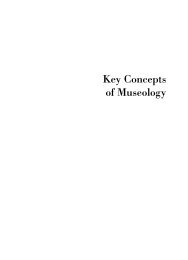ISS 25 (1995).pdf - The International Council of Museums
ISS 25 (1995).pdf - The International Council of Museums
ISS 25 (1995).pdf - The International Council of Museums
You also want an ePaper? Increase the reach of your titles
YUMPU automatically turns print PDFs into web optimized ePapers that Google loves.
heritage, a source <strong>of</strong> local identity and an instrument to acknowledge such<br />
identity ...<br />
Ten years later, Hugues de Varine supports new museological tendencies<br />
and experiences which link the museum to its social environment and give it an<br />
unprecedented pedagogical projection. <strong>The</strong> Declaration <strong>of</strong> Quebec, a true<br />
ideological platform for museologists, became later the document which grouped<br />
all new socialization trends <strong>of</strong> museums.<br />
As from the Round Table in Santiago, Chile in 1972, the conception <strong>of</strong> an<br />
integral museum privileged its social and political aspects. Through the<br />
implementation <strong>of</strong> more integral services, it reached new sectors <strong>of</strong> the<br />
population, including a previously alien public.<br />
In 1992 -exactly twenty years later- museums' representatives <strong>of</strong> Latin<br />
America and the Caribbean met in Caracas, Venezuela to update the problems <strong>of</strong><br />
the Santiago meeting. <strong>The</strong>y reached final conclusions which figure in the<br />
Declaration <strong>of</strong> Caracas, a document <strong>of</strong> great value which assesses the new<br />
challenges faced by museology at present.<br />
<strong>Museums</strong>' activities, which were before addressed almost exclusively to<br />
students and tourists, contemplate now other social sectors which result highly<br />
benefitted by the social and cultural action displayed and the participation <strong>of</strong> the<br />
popUlation: museums where the subject plays an active role in the teachinglearning<br />
process; museums that are alternative education spaces and bring the<br />
subject into closer contact with the museological discourse in a critical, reflexive<br />
manner.<br />
<strong>The</strong> paradigms which before supported the social, political and cultural<br />
practices and theories are now not enough to explain changes produced by<br />
globalization. <strong>The</strong> museum-related discourse may not come to a happy ending if it<br />
has no valid interlocutor to demand concrete, dynamic actions. If the museum<br />
does not render a service to the community, it is condemned to disappear. Today,<br />
a more demanding society, more participative and creative, obliges him to review<br />
its practices, its functions and objectives which must be now supported by<br />
policies which tie closer bonds with the community.<br />
<strong>The</strong> use <strong>of</strong> methodological strategies -which permit the community to reencounter<br />
itself through the museum- is based on the defense and preservation<br />
<strong>of</strong> the integral heritage, natural and cultural. <strong>The</strong>y foster a process <strong>of</strong> collective<br />
transformation which, as from the existing reality, promotes the development <strong>of</strong><br />
social awareness.<br />
Important experiences on the part <strong>of</strong> community museums show they have<br />
contributed to rescuing collective memory, historical moments which contribute to<br />
recovering the identity <strong>of</strong> a community.<br />
40
















